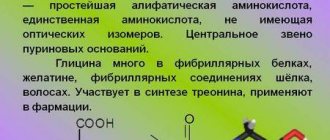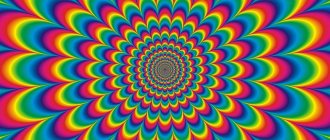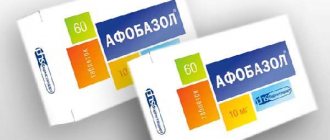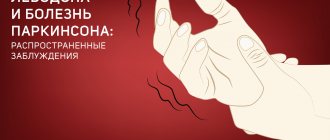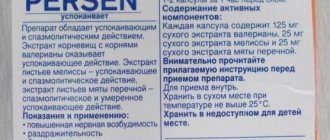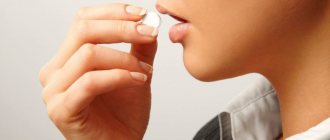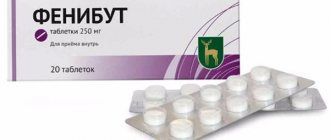Good health, vigor and healthy body are the key to any successful person. But in an urban environment it is not so easy to always be in good shape. Many people suffer from insomnia, which takes away strength and prevents them from moving forward confidently. The causes of sleep disturbances are usually disruptions in the functioning of the nervous system and stress. But even at home you can restore your health. It is enough to use Glycine for sleep, and you will quickly forget about insomnia.
Share
Tweet
Share
Cool
Send
What is Glycine: general information
Glycine is a sedative that helps normalize the functioning of the nervous system, get rid of insomnia and emotional stress, and also improves mental activity. Its main component is the amino acid of the same name. A separate advantage is the natural origin of the drug, which makes Glycine safe for health.
The drug belongs to aminoacetic acids and has strong nootropic properties. Glycine helps with insomnia due to its calming effect.
Compound
In addition to the main active component, the amino acid glycine, the product also includes excipients:
- Water-soluble methylcellulose;
- Magnesium stearate.
The mass of the active substance in tablets is 100 mg, it contains 2 mg of additional components. Some manufacturers produce Glycine with a different dosage, where the active amino acid content reaches 300 mg. In pharmacies you can also purchase a new type of medicine - Glycine Forte, which contains the main B vitamins. Taking this Glycine at night, you will not only achieve a calming effect, but also significantly increase the speed of thinking and improve body tone.
Release form
The medicine is sold in the form of white tablets, packaged in blisters. The packaging is a regular cardboard pack containing 50 tablets.
The taste of the drug is light and sweet, with notes of metal. As a sleeping pill, Glycine can be purchased at any pharmacy. You do not need a doctor's prescription to purchase.
pharmachologic effect
The medicine has a beneficial effect on the functioning of the central nervous system due to the fact that it improves metabolic processes in the brain. The amino acid glycine is a neurotransmitter involved in the transmission of impulses between neurons in the brain. When taking the drug, the work of glutamate receptors begins to be regulated, which is why metabolism is restored and the processes of protective inhibition in the central nervous system are activated.
The rapid effect of Glycine on the body is due to the fact that it is able to penetrate most of the tissues and fluids of the body. Some of the advantages of the drug include rapid disintegration. As a result, glycine does not accumulate in tissues, but is converted into water and carbon dioxide.
How to help improve sleep
Glycine is an excellent remedy for insomnia, sold in pharmacies and is not a serious medicine. It acts quite understandably and expectedly - it compensates for the lack of the necessary acid involved in the biochemical processes of the brain. You can stop taking it and try to forget about the problem, or you can use several recommendations for changing your lifestyle and habits and forget about the problem forever.
- First of all, you need to go to bed and wake up at the same time. This creates a biological clock, following which helps the body wake up and fall asleep more easily;
- It is necessary to get into the habit of ventilating the bedroom before going to bed;
- It is worth making sure that the bed and pillow are comfortable, and that there is no irritating light, noise or sounds;
- Avoid heavy and fatty dinners. Spicy and sour foods are also undesirable for dinner;
- Caffeine-containing drinks should also be excluded after 18:00;
- Avoid late-night snacking. It wakes up the body at night to digest food;
- Excessive liquid before bed is undesirable. It often contributes to waking up in the middle of the night and going to the toilet;
How is the drug useful?
By taking Glycine before bed, you will not only get rid of insomnia, but also feel other effects from this metabolic drug. The drug affects the body as follows:
- Helps get rid of irritability, depression and improves mood.
- Activates intellectual abilities, increases brain performance.
- Helps reduce emotional stress after stress.
- Reduces conflict and aggressiveness.
- It is an assistant in restoring health after a stroke or brain injury.
- Restrains the negative effects of psychotropic drugs on the central nervous system, as well as the toxic effects of ethyl alcohol and other potent drugs.
- It is a preventive drug for vegetative-vascular disorders and other diseases associated with veins and blood vessels.
- Reduces the desire for bad habits.
- Reduces the likelihood of brain disorders.
- Positively affects vision and muscle tone.
Should I take glycine before bed?
Glycine should be taken before bedtime if there are problems with rest: inability to fall asleep immediately even if very tired, waking up in the middle of the night for no apparent reason. The drug is an aliphatic amino acid that has several types of effects on the body:
- Inhibition of the synthesis of substances that cause overexcitation, as well as regulation of the functioning of nerve cells. This means the drug calms and relieves emotional and physical stress.
- Slowing down the transmission of impulses to muscles. They also relax, which is necessary to calm the nerves and fall asleep quickly, because one of the factors that interferes with balance is muscle tone.
- Restoring blood supply to the brain. The drug relieves spasm not only of muscle fibers, but also of blood vessels. Normal blood flow ensures the supply of oxygen to brain cells, which means it relieves headaches.
Indications
The drug will help with the following problems:
- from insomnia, intermittent shallow sleep;
- with causeless anxiety;
- for neuroses;
- from depression, emotional burnout;
- with outbursts of irritability, increased conflict;
- with aggressiveness, unstable psychological state, caused by alcohol intoxication or, on the contrary, forced abstinence from alcohol;
- with decreased performance, memory impairment;
- from vegetative-vascular manifestations;
- with deviant behavior of children and adolescents;
- from some consequences of ischemic stroke and traumatic brain injury.
Glycine also improves sensitivity to antipsychotics, antidepressants, sleeping pills and anticonvulsants, since
reduces their side effects. While taking it, memory becomes stronger and the thinking centers of the brain are activated.
Contraindications
The drug is contraindicated in case of intolerance to one of the components, but this happens infrequently. Glycine can make you feel worse if you have low blood pressure. It is not categorically contraindicated for hypotensive patients, but the indicator must be monitored when taking it. Pregnant, lactating and diabetic patients should discuss the use of Glycine with their doctor.
And here is more information about the rules for using Glycine for infants.
Influence on dreams
Glycine does not provoke nightmares during sleep, but makes dreams more vivid and memorable. This occurs because the components of the drug act on the receptors of dopamine and serotonin cells. The body produces more “pleasure hormones.” This affects the nervous system and brain in such a way that entire stories arise in it during sleep.
How it affects sleep and wakefulness phases
Glycine affects sleep in such a way that the sequence and duration of the deep and superficial phases is restored. While taking it, it is easier to fall asleep and causeless awakenings stop. And the deep sleep phase makes up 70% of the time allotted for night rest. This allows the body to recover, eliminates daytime lethargy and the desire to lie down.
In what cases is Glycine prescribed?
The drug is prescribed by doctors as an independent remedy, as well as in combination with other tablets, depending on the patient’s health condition. Among the indications for the use of Glycine, it is worth paying attention to the following:
- Heavy loads and stress.
- Decreased thinking and brain activity.
- Insomnia.
- Irritability, depression, increased aggressiveness.
- The presence of vascular diseases that appeared after stress.
- When the body is intoxicated with alcohol or other harmful substances.
- After traumatic brain injury and stroke.
The drug is often prescribed to teenage and school-aged children if they experience mood changes or poor academic performance. It is also recommended for people whose condition is highly dependent on weather conditions.
Glycine for VSD
Please note that Glycine not only improves sleep, but also helps cope with vegetative-vascular dystonia, which often accompanies insomnia. This syndrome is diagnosed in a huge number of people and is considered one of the most common.
Typically, VSD is accompanied by rapid heartbeat, headaches, hypertensive crises, and discomfort in the stomach. To get rid of such symptoms, you need to take the metabolic agent 3 times a day: in the morning, in the afternoon and in the evening. Treatment lasts at least three weeks.
What can replace the drug?
Instead of Glycine, the following remedies will help with stress and sleep disorders:
- Phenibut. This is a drug based on aminophenylbutyric acid, which also has a beneficial effect on metabolic processes, improves blood supply to the brain and vascular function. Therefore, Phenibut helps reduce anxiety and irritability, fall asleep faster at night and feel more alert during the day. The cost of a package of 10 tablets is 60-70 rubles.
- Novo-Passit . The basis of the drug is made up of soothing herbs: valerian, motherwort, lemon balm, cyanosis rhizomes, as well as vitamin C. Therefore, it alleviates stress, relaxes the nervous system, and copes with insomnia. The price of 60 tablets is from 700 rubles, since Novo-Passit is produced in Israel.
- Tenoten . The product relieves stress, improves memory and brain function in general, and restores the nervous system. But it is not prescribed to patients under 18 years of age, unless it is a special children's Tenoten. And the drug is also not prescribed to improve sleep. Price – from 250 rub. for 20 tablets.
- Persen . This is another herbal remedy, it contains valerian, lemon balm and peppermint. Therefore, it is indicated for irritability, anxiety, insomnia, and also to relieve spasms caused by nervous tension. Cost – from 270 rub. per pack of 40 tablets.
- Reslip . The main active ingredient of the product is doxylamine succinate, so it has a sedative effect, makes it easier to fall asleep, and has a beneficial effect on the quality of sleep. It is used as a sleeping pill. The price of the drug is from 140 rubles. for 10 tablets.
How to take Glycine for insomnia: dosage
Regardless of the course of treatment, the tablets are taken by sucking under the tongue. For infants who are not yet able to take the drug on their own, it is recommended to make a powder out of the tablet and apply it to the nipple.

Glycine for sleep for adults
It is prescribed in several ways. When prescribing the drug, the presence of other diseases is also taken into account. For short-term disorders, it is enough to take one tablet twenty minutes before bedtime. Continue the course until the insomnia goes away.
If sleep problems have been bothering you for a long time, then we recommend trying the following course:
- For two weeks, dissolve Glycine half a tablet in the morning, during the day and in the evening.
- For the next 9 days, take 0.5 grams per day.
Note. The effect of the product depends on personal tolerance. Some adults may need to take 2 Glycine tablets at night to achieve the benefits. If one tablet doesn’t make you want to sleep, then you should increase the dosage.
Glycine for children's sleep
For children over 3 years of age, the drug is prescribed one tablet two to three times a day, depending on the state of health and the presence of other complications. The duration of the course lasts from two weeks to a month, at the discretion of the doctor.
Children under three years old should take half a tablet for one or two weeks.
Video on the topic

Before going to bed, glycine is taken 20 minutes before going to bed, then insomnia will subside, and rest will be complete, without awakenings and nightmares. Adults take 1 tablet, placing it under the tongue or upper lip; children under 3 years of age are given half this dose.
If insomnia occurs due to stress, vegetative-vascular manifestations, neurosis, depression, the drug should be taken in a course, that is, for 15-30 days, 3-6 tablets per day. Do not give the product to infants or take it to pregnant or lactating women. Hypotensive patients and allergy sufferers should use it with caution. You can replace Glycine with Novo-Passit, Tenoten, Phenibut, Persen.
Side effects and contraindications
The drug does not cause serious side effects in case of overdose. In rare cases, allergic reactions, nausea or dizziness may occur. The main contraindications include the following:
- Sensitivity to the components of the drug.
- Low blood pressure.
If you are predisposed to arterial hypotension, discuss the dosage with your doctor. And if you take the drug, monitor your blood pressure.
Note. Glycine is a non-addictive drug. It can be used even with minor sleep disturbances.
Be healthy!
Glycine is the simplest aliphatic (i.e., not forming aromatic bonds) amino acid involved in the biosynthesis of proteins. Glycine is also called aminoacetic acid, under this name it is listed in the composition of the medical drug “Glycine”. Glycine is an amino acid that can be produced by the body itself. The drug is prescribed as a mild sedative and to improve brain function.
This amino acid is part of the substance used in developing photographs. “Glycine” translated from Greek means “sweet”; the amino acid tastes sweet, therefore it is produced in the food industry as a flavoring additive E640.
Glycine is a substance that has calming, anti-stress and nootropic (affecting mental activity) properties. It also helps normalize metabolic processes in the brain. Currently, glycine is included not only in sedative medications, but also in various dietary supplements.
The role of glycine
The body needs glycine in different situations:
- for the working population as an antidepressant, sedative and sleeping pill;
- for students - to improve academic performance and assimilation of knowledge, especially during the session, when the brain is at work;
- for teenagers with deviant behavior – to calm and harmonize;
- for young children - to improve sleep and cope with hyperactivity;
- for older people – improve memory and delay the onset of sclerosis.
Functions
Glycine acts on nerve cells, regulating active processes (excitation, inhibition) - it reduces hyperactivity and calms, a similar effect is exerted by taurine (a sulfonic acid formed from an amino acid). The substance easily and quickly penetrates the nervous system, improves brain nutrition, helps improve memory, and increases mental performance.
The drug works as follows:
- activates metabolic processes in the brain;
- takes part in the transmission of nerve impulses;
- blocks the production of stress hormones: adrenaline, norepinephrine;
- gets rid of toxins that destroy brain cells;
- relieves the effects of stress on the nervous system;
- helps speed up recovery after strokes;
- reduces the effects of alcoholism and drug addiction on the central nervous system.
Glycine is an essential amino acid for the human body, along with amino acids such as lysine, tryptophan, and glutamine.
Application
Indications for use
The composition of the drug "Glycine" includes aminoacetic acid (i.e. glycine itself) and excipients: magnesium stearate and water-soluble methylcellulose.
Glycine is prescribed to adults who have suffered strokes, traumatic brain injuries, and children with brain pathologies (encephalitis). In addition, it helps fight stress and improves sleep. Glycine is indicated for various disorders of the nervous system (stress, depression, anxiety, increased excitability) and disorders of brain activity. For older people, the drug should be used for memory disorders such as sclerosis and amnesia (quercetin can also be used for such disorders). It improves cerebral circulation, which in turn leads to efficient absorption of glucose (fuel for the brain) and activates memory.
Glycine is a long-acting drug, i.e. it should be taken in long courses. Glycine is well accepted by the body because there are receptors in the brain and spinal cord responsible for recognizing this amino acid. Once in the gastrointestinal tract, glycine is quickly absorbed into the blood and distributed throughout the body. It decomposes in the liver into water and carbon dioxide and is excreted from the body.
Properties of glycine
Since aminoacetic acid is present in the human body and is easily absorbed, the drug glycine has a lot of useful properties, and it acts gently and is not addictive:
- soothing;
- anti-anxiety (tranquilizing);
- antidepressant, improves mood;
- antitoxic (for alcoholism and drug addiction);
- metabolic (accelerate and qualitatively improve metabolic processes in the spinal cord and brain), accelerates recovery processes after strokes and traumatic brain injuries;
- improving brain performance and enhancing mental activity.
- Glycine for VSD (vegetative-vascular dystonia). Vegetative-vascular dystonia affects about 80% of people; it is not classified as a disease - it is a complex disorder of the autonomic nervous system, which is responsible for the functioning of organs, glands, blood and lymphatic vessels. There are several types of vegetative-vascular dystonia, depending on the organs affected, but most often the cardiovascular system suffers. Glycine successfully acts in cases of disorders of brain activity, it improves cerebral circulation and improves brain performance, relieves nervous tension.
- Glycine for memory. Glycine creates favorable conditions for the effective functioning of neurons, inhibiting hyperactivity and calming, thus improving concentration and memory. But it is impossible to improve memory with one dose of the drug; glycine begins to act some time after starting to take the medicine.
- Glycine for sleep. Increased nervous excitability, constant stressful situations, excessive physical activity and fatigue lead to sleep disturbances. Glycine helps calm the nervous system and improve sleep. It should be taken 20 minutes before bedtime, 100 mg (1 tablet).
Glycine interaction
The interaction of glycine with other substances has been studied quite well. In particular, aminoacetic acid combines with zinc and magnesium, which promotes the rapid absorption of these substances.
In medicine, glycine interacts with antidepressants and anticonvulsants, neutralizing their toxicity. It is not recommended to use this substance with tranquilizers and sleeping pills, because it will only enhance their effect.
Forms of glycine
- Glycine powder. Glycine powder is regular glycine, you just need to measure the dosage yourself. Available in plastic jars. Such a powder can be pure or enriched, for example, with vitamin B1, etc. You need to take this powder 1 dose 3 times a day. The measured contents should be poured under the tongue and held until completely dissolved; there is no need to wash it down with water. The course of admission is one month.
- Glycine: tablets. Glycine tablets are the most convenient and most common form of the drug in Russia. They are small, round, white, and come in blisters of 50 pieces. 1 tablet contains 100 mg of the substance - a single dose of the drug. Abroad, glycine is found in tablets and capsules in higher dosages.
Glycine: Magnesium B6. Magnesium B6 can be called an analogue of glycine. Magnesium B6 is necessary for the human body because it compensates for the lack of magnesium in the body. Magnesium is responsible for the normal functioning of the cardiovascular and nervous systems. Preparations containing the magnesium + B6 complex are prescribed for sleep disorders, increased excitability, mental and physical fatigue, and muscle spasms.
Glycine: arginine. Glycine is very often used in conjunction with arginine. Glycine is a source of a substance such as creatine, which is involved in energy metabolism in muscle tissue. Arginine has similar functions: it is involved in nitrogen and energy metabolism and promotes the growth of muscle tissue.
Mode of application
Instructions for use of “Glycine” are detailed and informative. It describes both the properties and effect of the drug, as well as the dosage for taking the medicine. If the attending physician has not prescribed a specific dosage. You can safely refer to the instructions and follow its recommendations.
Directions for use: for a healthy adult – 300-400 mg per day, for teenagers – up to 300 mg, for children – no more than 100. For adults and teenagers, the duration of a course of glycine is limited to a month, for children – two weeks.
The main way to take glycine is to place the tablet under the tongue and slowly dissolve it. The mucous membranes have a good ability to absorb drugs. With this method, the drug will quickly dissolve and be sent to its destination. The medicine reaches the mucous membrane and the gastrointestinal tract, and then into the central nervous system and the brain.
Is it possible to take glycine constantly?
Glycine does not accumulate in the body, so its constant use is possible, but it is undesirable; it is necessary to take breaks between doses of the drug for at least a month.
Overdose
Although glycine is considered a harmless drug, excessive use can lead to an overdose.
Signs of overdose:
- A sharp decrease in blood pressure, darkening of the eyes, dizziness, weakness.
- Increased sleepiness.
- Apathy.
- Inability to concentrate on a specific action.
- Impaired liver and kidney functions.
Contraindications
Glycine has no contraindications, except for individual intolerance to the substances included in the drug. This happens because glycine is a natural amino acid in the human body.
Glycine for insomnia: reviews
- Maria, 40 years old. Recently, I had the opportunity to test from my own experience whether Glycine helps with insomnia. In my case, the remedy turned out to be quite effective, but not immediately. I took a dosage of 2 tablets before bed. After about 1.5 weeks, the insomnia began to go away and my mood improved. It also became easier to wake up in the morning.
- Alexander, 32 years old. The doctor prescribed glycine for my daughter. At the age of 10, she began a transitional period, her mood began to change frequently, and at some point the child could not cope with the stress of school. The drug was prescribed as a sedative, but my wife and I noticed that Glycine also helps with sleep.
- Anna, 27 years old. Due to severe stress at work, I have not had normal sleep for 3 years now. I recently discovered an excellent drug. I recommend! Glycine really helps you sleep.
- Valentina, 51 years old. I was worried not so much about insomnia as about being too light a sleeper. I read the reviews and decided to try Glycine. At first, I couldn’t decide for a long time how many Glycine tablets I needed to take in order to fall asleep soundly. I decided to start with one, and that was enough. I noticed an improvement in just a week.
Source
Who can take Glycine?
The instructions state that the medicine can be taken by everyone, even a child over three years of age. It is enough to give the baby 50 mg of the drug, and he will behave calmly and fall asleep in 20-35 minutes.
Only expectant and nursing mothers are prohibited from drinking Glycine for insomnia, since experts have not conducted testing on this group of consumers.
The drug is not recommended for use as self-medication and should only be prescribed by a qualified physician.
How to give glycine to children?
Is glycine okay for children? Glycine is an amino acid that is present in the human body and its deficiency can adversely affect it. The period of active growth in children is accompanied by various disorders of the nervous system; many experience increased excitability and hyperactivity. In such cases, doctors recommend giving children glycine as a sedative.
Glycine is recommended for children under one year of age and older for hyperactivity and sleep disorders; it calms and normalizes nervous processes in the child’s body and helps accelerate the child’s development.
Due to age characteristics and the inability to perform certain actions, a child cannot take glycine according to the rules, so it is recommended to add it to food: formula, milk, complementary foods.
What will help with insomnia if glycine does not help?
Glycine is a sedative that helps cope with insomnia and calm the nerves. Experts also recommend taking it after excessive alcohol consumption or after a stroke. It is important to study the instructions and learn how to take the medication correctly.
Description of the drug
Glycine for insomnia is an absolutely safe sedative. The medicine helps regulate metabolism in the body and improves all intellectual abilities. It is an effective remedy for insomnia, as it improves the quality of dreams and facilitates the process of falling asleep.
Glycine also has the following effects:
- prevents sleep problems;
- helps reduce diseases affecting veins and blood vessels;
- fights depression and irritability;
- normalizes vision;
- reduces love for alcohol;
- enhances thinking abilities;
- eliminates muscular dystrophy.
With a properly calculated dosage, the drug has only a beneficial effect.
Release form and composition
Glycine for insomnia - tablets, available in a box of 50 pieces. The active ingredient is glycine. Additional components:
- calcium stearate;
- povidone;
- montan glycol wax.
The tablets have a slight sweetish-metallic taste. You can buy the drug without a prescription at any pharmacy kiosk.
Manufacturers
Manufacturers of the drug:
- Vertex (Russia);
- Tatkhimpharmpreparaty (Russia);
- BIOTICS MNPK (Russia);
- OZONE;
- KANOPHARMA PRODUCTION (Russia);
- Evalar (Russia);
- Pharmgroup (Russia).
Indications for use
Drug therapy is prescribed only by a doctor, depending on the ailment and condition of the person. Drink at:
- with frequent quarrels;
- during conflicts;
- before taking exams, sessions;
- constant stress.
The problems listed above and others have a negative impact on the body and lead to depletion of energy reserves.
Important! All of these conditions very often apply to infants who are trying to explore the world.
Contraindications and special instructions
Glycine is contraindicated only in case of hypersensitivity to the components of the product. Also not to be taken by patients who have had an allergic reaction to one of the substances in the past.
Alcohol and glycine are not compatible. Drinking alcohol during therapy can cause significant harm. This can have a detrimental effect not only on the nervous system, but also on the liver. Ethanol also inhibits the effect of the drug on the body.
Attention! Glycine for insomnia can be taken even during breastfeeding, thereby delivering a small amount of amino acid to the baby.
Side effects
When taking Glycine, there is a possibility of developing an allergic reaction, which manifests itself in the form of hyperemia of the dermis, itching, rashes, allergic rhinitis, and shortness of breath. Do not exclude dangerous manifestations of allergies:
- Quincke's edema;
- swelling of the larynx;
- anaphylactic shock;
- diarrhea;
- vomit;
- pallor and cyanosis of the epidermis;
- a sharp narrowing of the bronchi and larynx, which leads to difficulty breathing.
If serious reactions occur, call an ambulance.
Benefits and harms of use
Considering the advantages and disadvantages, the drug has many more advantages. Glycine has a mild effect and is not addictive. The drug improves the quality of sleep, reduces the number of awakenings, and allows you to get a good night's sleep until the morning. The medication also suppresses the occurrence of the negative effects of psychotropic drugs.
Negative aspects include the possibility of adverse reactions. If the dose is incorrectly calculated, overdose symptoms may appear.
Instructions for use and dosage
Glycine tablets are intended for resorption. The standard dosage is 3 g - 1 tablet three times a day. This treatment regimen is indicated for adults and the elderly:
- with frequent awakenings during night sleep;
- to increase intellectual abilities;
- with severe pathologies of the nervous system;
- in case of sleep disturbance;
- to calm down.
If the patient is overtaken by insomnia, then drink this way:
- in the first 14 days of therapy, dissolve half a tablet three times a day;
- then drink 0.5 g per day for 9 days.
After a stroke, the scheme is as follows:
- in the first hours take 10 mg;
- for 5 days, 10 g, and to alleviate the condition, drink 2 tablets three times a day.
Women with menopausal syndrome take 1 gram, after a short period of time another gram, and after an hour the same amount. Then take 4 tablets throughout the day.
With vegetative-vascular dystonia, hypertensive crises, abdominal pain, and migraines may appear. For this problem, take 1 tablet in the morning, afternoon and evening. Duration of therapy is 21 days.
The use of the drug is also beneficial for children. Glycine is prescribed for infants and older children. Taking it promotes calm and better sleep. The dosage is determined by a neurologist after a thorough examination of the baby.
Glycine is prescribed to pregnant and nursing mothers for various nervous system disorders such as sleep disturbances, overexcitation, and fatigue. During pregnancy, the dosage is prescribed by the doctor individually. Usually prescribed 1 tablet three times a day.
Source: https://hpt-kld.ru/chto-pomozhet-ot-bessonnitsy-esli-ne-pomogaet-glitsin/
Functions of glycine
Glycine is part of proteins: the amino acid is integrated into ongoing metabolic processes. The most important actions of the drug include:
- neuro-metabolic;
- neuro-protective;
- antioxidant.
In general, the mechanism of action is aimed at normalizing metabolism and inhibition processes in the central nervous system. Glycine can be called a building material involved in the production of necessary enzymes, hormones, and proteins. Usually the amino acid is supplied to the body in sufficient quantities through food, but sometimes the body requires its excess.
- with psycho-emotional stress, irritability, tendency to conflict;
- to improve social adaptation;
- to normalize sleep processes;
- with damage or injury to the brain;
- to reduce the effect of toxins on brain cells.
Glycine is prescribed as part of complex therapy for such serious diseases as stroke, toxic poisoning with substances that depress the central nervous system, and traumatic brain injuries. Taking amino acids helps with sleep problems:
- prolonged falling asleep;
- shallow superficial sleep;
- frequent waking up at night;
- difficulty waking up;
- feeling tired and exhausted after sleep.
Thus, glycine combines the properties of a nootropic (improves memory and concentration), a sedative and a natural sleeping pill. The drug exhibits all its properties gently but effectively.
Glycine for sleep (adults)
Sedatives are used to correct mild nervous system disorders. Among them, for example: extracts of valerian, motherwort, Persen, Phytosedan and others. They are shown when:
- increased anxiety;
- irritability;
- sleep disorders;
- fears;
- disorders of the autonomic nervous system (sweating, tremors) and other conditions.
They also make it easier to fall asleep, but this effect is associated with relaxation of the nervous system. In this case, the body does not recover. Melatonin levels remain reduced, so taking them is often accompanied by a feeling of sleepiness the next morning. Until the age of 30, this condition may not be observed, since the sleep hormone is produced in sufficient quantities.
